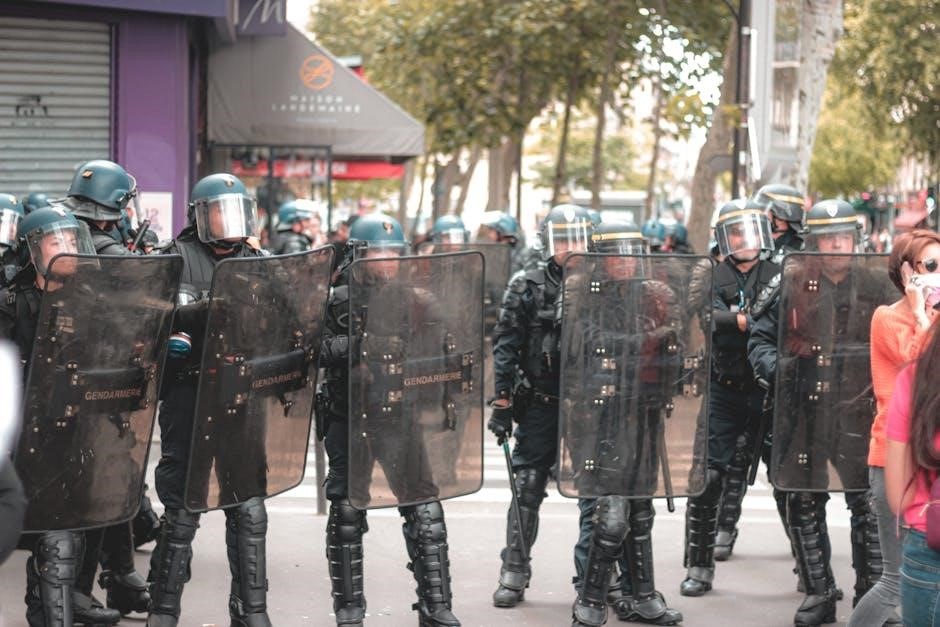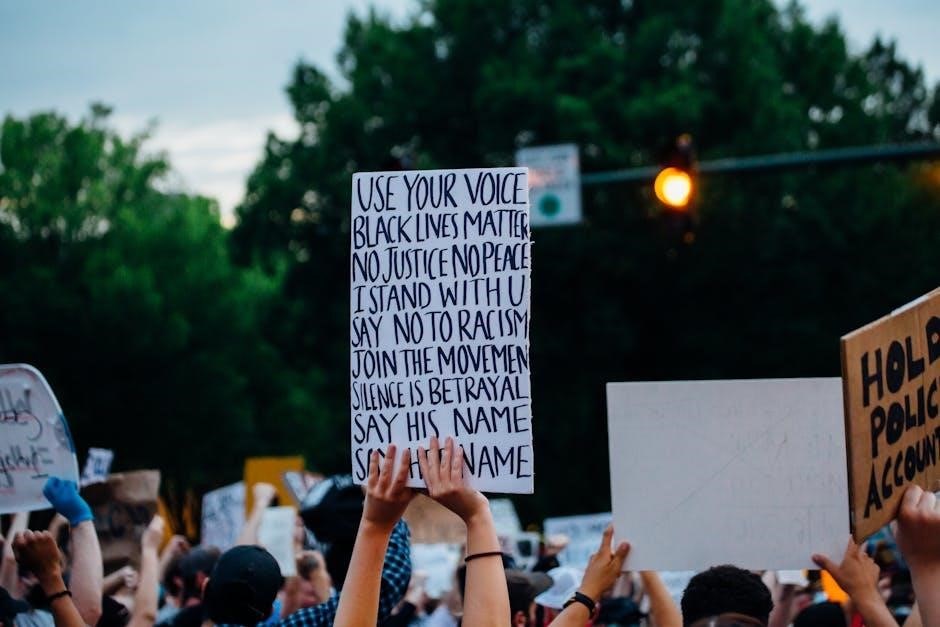The Power and Conflict anthology is a collection of poems exploring themes of authority, morality, and the human cost of war. It features works by renowned poets like Wilfred Owen and Simon Armitage, offering insights into power dynamics and emotional struggles. The anthology is widely studied in educational settings, providing a lens to analyze complex emotions and moral dilemmas, while fostering critical thinking and empathy in readers.
Overview of the Anthology
The Power and Conflict anthology is a thought-provoking collection of poems that delve into themes of authority, morality, and the human experience of war. Featuring works by poets such as Wilfred Owen and Simon Armitage, the anthology explores power dynamics, emotional struggles, and societal impacts. Designed for educational study, it provides a platform for analyzing complex emotions and moral dilemmas, fostering critical thinking and empathy. The poems are structured to encourage deeper understanding of historical and contemporary issues, making it a valuable resource for literary analysis.
Structure and Key Themes
The Power and Conflict anthology is structured chronologically, exploring themes of power, authority, and their emotional impact. Poems like Wilfred Owen’s Exposure and Simon Armitage’s Remains delve into the harsh realities of war, while others examine moral dilemmas and personal struggles. The anthology contrasts the might of authority with the vulnerability of individuals, inviting readers to reflect on the consequences of power and the enduring effects of conflict on humanity.
Significance in Literary Studies
The Power and Conflict anthology holds profound significance in literary studies for its exploration of universal themes. It offers insights into human experiences, morality, and societal dynamics, making it a valuable resource for analyzing power structures and emotional responses to conflict. The anthology’s diverse poetic voices and historical contexts enrich understanding, enabling students to develop critical thinking and empathy through nuanced textual analysis.
Themes of Power and Authority
The anthology examines power dynamics, exploring how authority shapes human behavior and societal structures. Poems depict the emotional and psychological impact of power on individuals and groups.
Exploration of Power Dynamics

The anthology delves into power dynamics, showcasing how authority is exercised and challenged. Poets like Shakespeare and Armitage illustrate struggles between dominance and resistance, highlighting emotional and societal impacts. Themes of control, submission, and rebellion are central, revealing power’s dual nature—both constructive and destructive. Through vivid imagery and emotional depth, the poems explore how power shapes individual and collective identities, often leading to tension and transformation. This exploration offers profound insights into human nature and societal structures.
Authority Figures in Poetry
Authority figures in the anthology are often depicted as complex, embodying both power and vulnerability. Poets like Shakespeare and Armitage portray leaders as flawed individuals, highlighting the tension between their public roles and personal struggles. These figures, whether monarchs or military commanders, are shown exerting control while grappling with moral dilemmas. Their portrayals challenge readers to question the nature of leadership and the ethical implications of authority, fostering a deeper understanding of its impact on individuals and society.
Impact of Power on Individuals and Society
The anthology examines how power shapes individuals and societies, often leading to exploitation and manipulation. Poets like Wilfred Owen and Simon Armitage depict the devastating effects of authority, revealing how it can corrupt and destroy lives. The emotional and societal consequences of power imbalances are explored, highlighting the loss of humanity and moral decay. Through these works, readers gain insight into how power dynamics influence personal and collective experiences, fostering reflection on justice and morality in a flawed world.

Themes of Conflict and War
The anthology explores the brutality of war, its emotional toll, and moral dilemmas, offering vivid portrayals of conflict’s impact on humanity through powerful poetry.
Representation of War in Poetry
The anthology vividly portrays war’s brutality through poets like Wilfred Owen and Simon Armitage, whose works, such as “Exposure” and “Remains,” capture the raw reality of conflict. These poems depict the physical and emotional toll on soldiers, offering haunting imagery of battlefields and the psychological scars left behind. The verses challenge romanticized notions of war, instead presenting it as a tragic, devastating experience that reshapes humanity. By exploring themes of survival and loss, the poetry provides a powerful lens to understand the complexities of warfare and its lasting impact on individuals and society.
Emotional and Psychological Effects of Conflict
Poems in the anthology vividly depict the emotional and psychological trauma caused by conflict. Works like “Exposure” and “Remains” reveal soldiers’ inner struggles, such as anxiety, fear, and despair, highlighting the lasting scars of war. The verses convey the mental toll of survival, illustrating how conflict fractures identities and disrupts lives. Through haunting imagery and personal narratives, the poetry underscores the profound emotional impact of warfare on individuals and society, fostering empathy and deeper understanding of human resilience and vulnerability.
Moral Dilemmas in Times of War
The anthology delves into the moral complexities faced during warfare, as seen in poems like “Exposure” and “Remains.” These works portray soldiers grappling with ethical decisions, such as survival versus duty, and the blurred lines between right and wrong. The harsh realities of war force individuals to confront internal conflicts, questioning the justification of their actions. This exploration highlights the psychological toll of moral ambiguity, revealing how war challenges humanity’s ethical foundations and leaves lasting societal scars.
Themes of Morality and Ethics
The anthology explores ethical questions and moral ambiguity, particularly in wartime contexts, challenging readers to reflect on humanity’s ethical foundations and the emotional impact of conflict.
Ethical Questions Raised by Power
The anthology delves into ethical dilemmas posed by power, questioning its misuse and the moral consequences of authority. Poets like Shakespeare and Wilfred Owen explore how power corrupts, while others highlight the ethical complexities of leadership and control. These works challenge readers to consider the moral implications of actions driven by power, urging a deeper reflection on justice, responsibility, and the human condition. The poems provoke thought on the ethical boundaries of authority and its impact on individuals and society.
Moral Ambiguity in Conflict
The anthology examines the moral ambiguity inherent in conflict, where right and wrong blur. Poets like Wilfred Owen and Simon Armitage portray the complexities of war, revealing the emotional and psychological toll on individuals. Their works challenge readers to question the justification of violence and the ethical dilemmas faced in times of strife. The poems invite a deeper reflection on the human condition, highlighting the difficult choices and uncertain moralities that arise during conflict, leaving no clear distinction between heroism and sacrifice.
Justification of Actions in Poetry

Poets in the anthology often explore the justification of actions, particularly in times of conflict. Works like Shakespeare’s and Wilfred Owen’s reveal how individuals rationalize their decisions, whether driven by ambition, survival, or loyalty. Simon Armitage’s modern perspectives further highlight the complexity of guilt and redemption. The poems challenge readers to question the morality behind actions, offering nuanced portrayals of human behavior under pressure and the enduring emotional impact of such choices.
Themes of Social Change
The anthology highlights poetry’s role in advocating for social justice and challenging oppressive norms. Poets address historical movements, inspiring change through powerful narratives and emotional resonance.

Role of Poetry in Advocating Change
Poetry in the anthology serves as a powerful tool for social advocacy, giving voice to marginalized groups and challenging societal norms. Through vivid imagery and emotional depth, poets like Simon Armitage and Wilfred Owen highlight injustices and provoke reflection. Their works inspire empathy and action, demonstrating how poetry can drive meaningful change by addressing issues like war, inequality, and human rights, fostering a deeper understanding of social justice. Poetry’s ability to captivate and persuade makes it a potent force for advocacy and reform, encouraging readers to engage with critical issues and consider new perspectives.
Challenging Social Norms Through Verse
Poetry within the anthology confronts societal expectations, questioning established norms and encouraging critical reflection. Poets employ metaphor and symbolism to critique structures of power and inequality. Their verses often resonate with marginalized voices, challenging readers to reconsider accepted truths. By presenting alternative perspectives, the poems inspire dialogue and spark change, demonstrating the transformative power of literature in addressing social injustices and fostering a more inclusive understanding of human experience and societal structures.

Historical Context of Social Movements
The anthology reflects the historical backdrop of social movements, capturing the essence of rebellion and change. Poets like Wilfred Owen and Simon Armitage draw on wartime experiences, while others address civil rights and feminism. Their verses often mirror the struggles of marginalized groups, offering a lens into the evolution of societal norms. By grounding their work in historical contexts, these poets provide a powerful commentary on the ongoing fight for equality and justice, resonating across generations and inspiring collective action.
Key Poets and Their Works
The anthology features influential poets like Wilfred Owen, whose war poetry exposes the horrors of conflict, and Simon Armitage, offering modern perspectives on power and identity. Shakespeare’s works delve into themes of authority and moral struggle, enriching the collection’s depth and complexity;
William Shakespeare’s Contribution
William Shakespeare’s works in the anthology explore themes of power, authority, and moral complexity. Plays like Macbeth and Julius Caesar depict the corrupting influence of power and the internal conflicts of leaders. His exploration of human nature reveals the psychological effects of ambition and the ethical dilemmas faced by those in authority. Shakespeare’s masterful use of language and dramatic tension provides profound insights into the dynamics of power and its impact on individuals and society, making his contributions invaluable to the anthology.
Wilfred Owen’s War Poetry
Wilfred Owen’s poetry offers a harrowing depiction of war’s brutality and its psychological toll. His works, such as Exposure and Dulce et Decorum Est, vividly capture the suffering of soldiers, challenging romanticized notions of conflict. Owen’s vivid imagery and emotional depth expose the dehumanizing effects of war, emphasizing the moral ambiguity and futility of violence. His poetry remains a powerful anti-war statement, resonating deeply with themes of power and conflict in the anthology.
Simon Armitage’s Modern Perspectives
Simon Armitage’s poetry in the anthology offers a modern lens on power and conflict, blending personal narratives with universal themes. His work, such as Remains and The Universal Home Doctor, explores identity, morality, and human vulnerability. Armitage’s vivid imagery and nuanced language capture the complexities of contemporary life, providing a bridge between historical and present-day struggles. His unique voice enriches the anthology, inviting readers to reflect on power dynamics and emotional resilience in a relatable, modern context.

Analysis Techniques for Understanding the Anthology
Analyzing the anthology requires close reading of poems to uncover themes and language use. Comparative analysis highlights contrasting poet perspectives, while historical contextualization deepens understanding of the works.
Close Reading of Poems
Close reading involves meticulously analyzing poem structures, imagery, and tone to uncover deeper meanings. It helps identify how poets like Owen and Armitage use language to convey power dynamics and emotional struggles. By focusing on specific lines and literary devices, readers can better understand the poets’ perspectives and the anthology’s central themes of conflict and authority. This technique is essential for interpreting the emotional and psychological depth embedded in the poems.
Comparative Analysis of Themes
Comparative analysis of themes in the Power and Conflict anthology reveals contrasting perspectives on power and its impact. Poets like Wilfred Owen and Simon Armitage present war’s brutality through vivid imagery, while others, such as Shakespeare, explore authority’s moral complexities. By juxtaposing these works, readers can trace recurring motifs like sacrifice, control, and survival. This approach highlights the anthology’s depth, offering a nuanced understanding of how different poets address universal themes through unique stylistic and emotional lenses.

Historical Contextualization
Historical contextualization enriches the understanding of poems in the Power and Conflict anthology. Works like Wilfred Owen’s “Exposure” reflect the horrors of World War I, while Simon Armitage’s modern perspectives offer a fresh lens on conflict. Shakespeare’s exploration of authority in historical contexts adds depth to the anthology. By situating poems within their historical settings, readers gain insight into how societal norms and events shaped the themes of power, morality, and human resilience, enhancing the anthology’s relevance and emotional impact.
The Power and Conflict anthology offers profound insights into themes of authority, morality, and human resilience. Through diverse poetic voices, it remains a timeless, emotionally resonant exploration of conflict’s impact.

The Power and Conflict anthology delves into themes of authority, morality, and human resilience through works by poets like Wilfred Owen and Simon Armitage. It explores power dynamics, emotional tolls of war, and moral dilemmas, offering a lens to analyze societal and personal struggles. The anthology highlights the devastating effects of conflict on individuals and communities, while also showcasing the transformative potential of poetry in addressing social change and ethical questions. Its relevance in education underscores its enduring impact on literary studies and critical thinking.
Relevance of the Anthology Today

The Power and Conflict anthology remains highly relevant today, offering timeless insights into human nature, authority, and warfare. Its exploration of universal themes resonates with contemporary issues like human rights, political tensions, and social justice. The anthology’s focus on emotional and moral complexities continues to inspire critical thinking and empathy, making it a valuable resource for modern education and literary analysis. Its enduring appeal lies in its ability to connect past and present, fostering a deeper understanding of power’s impact on individuals and society.